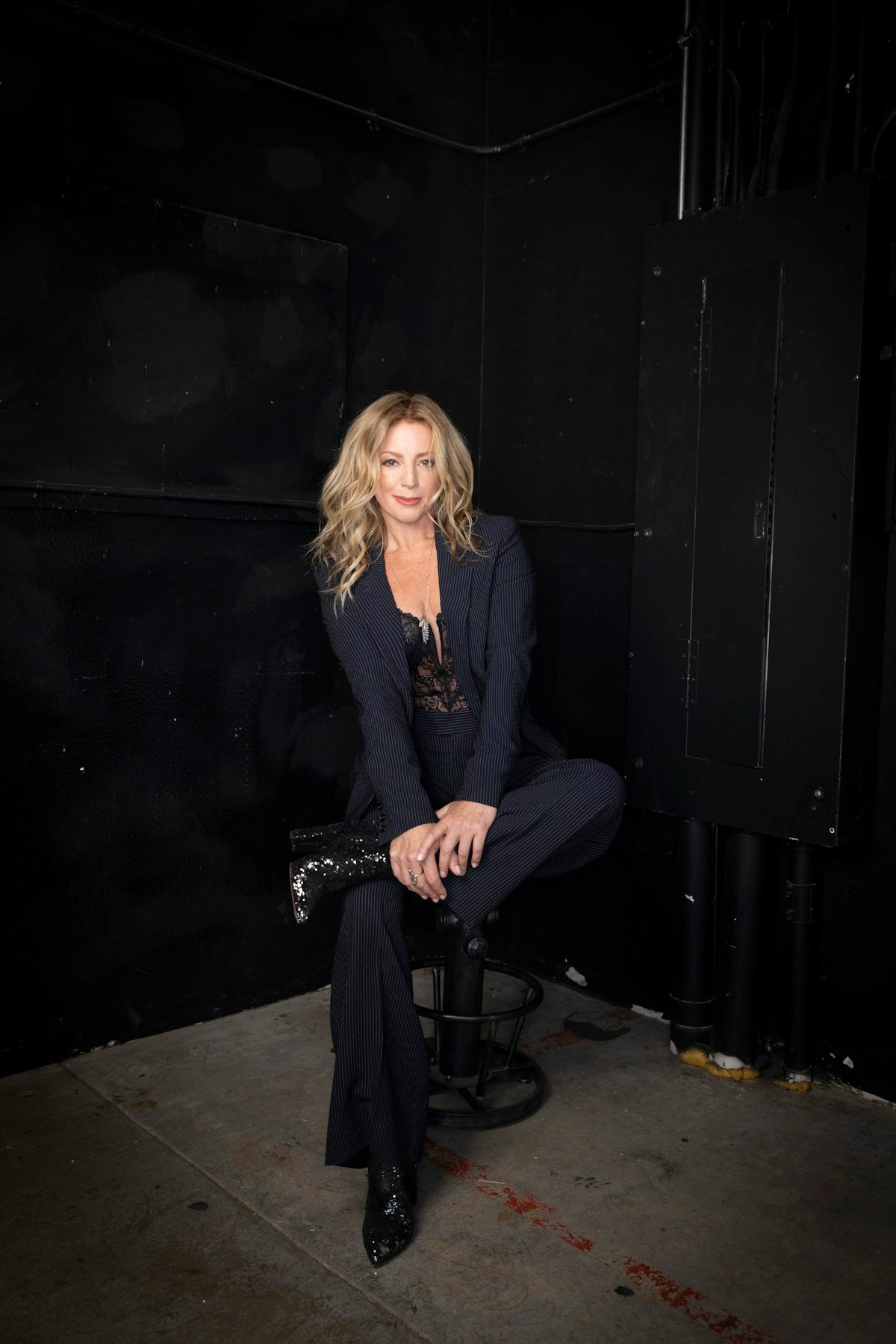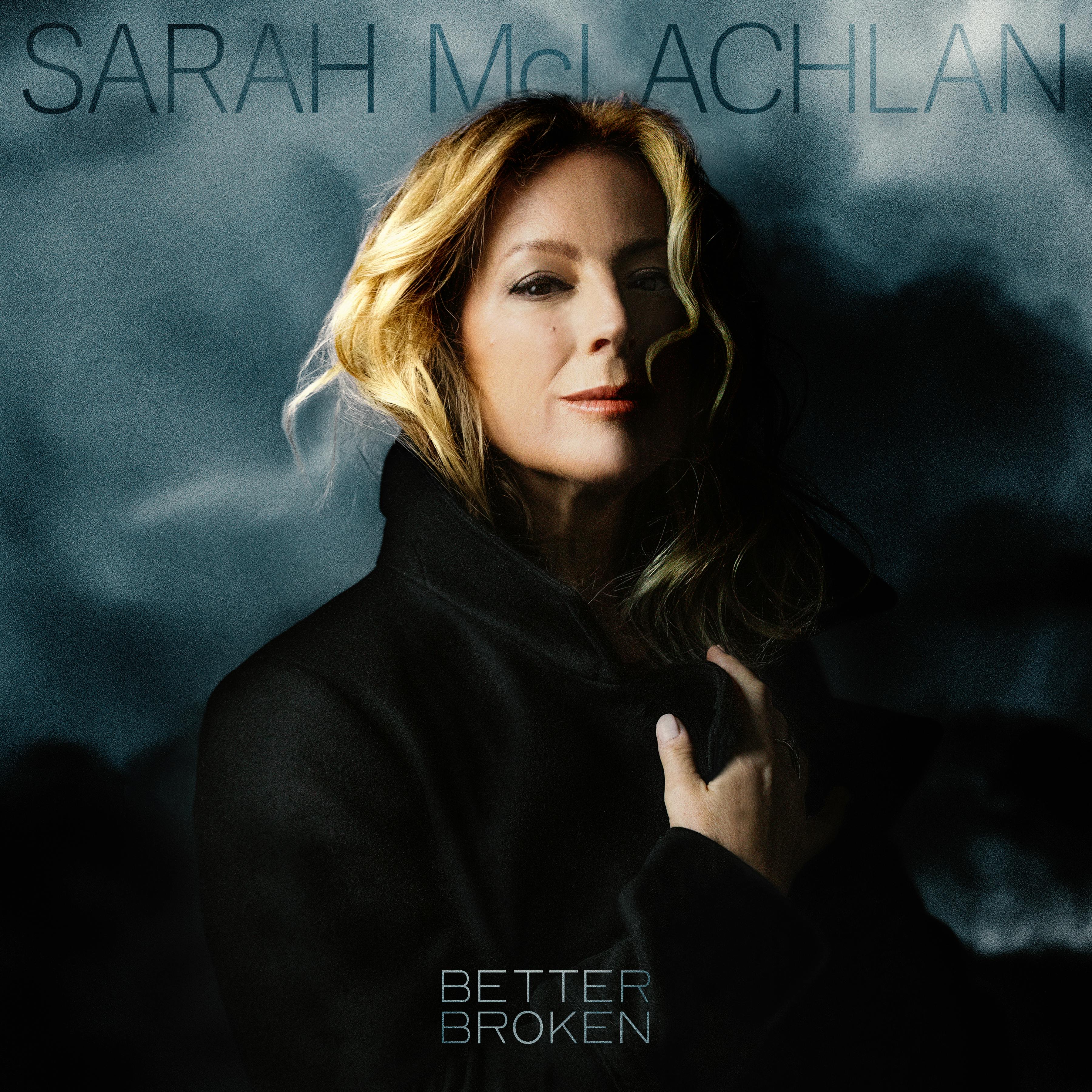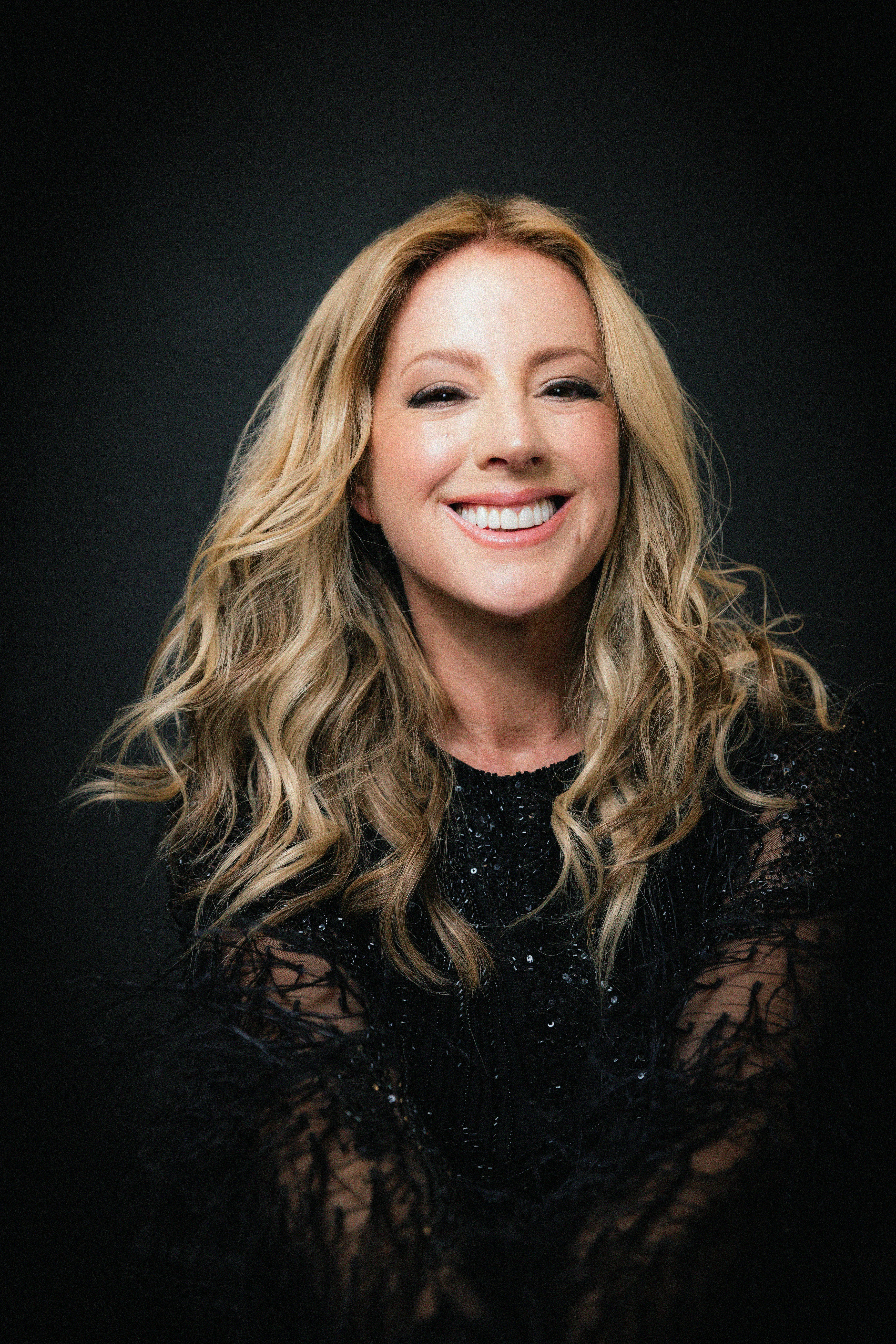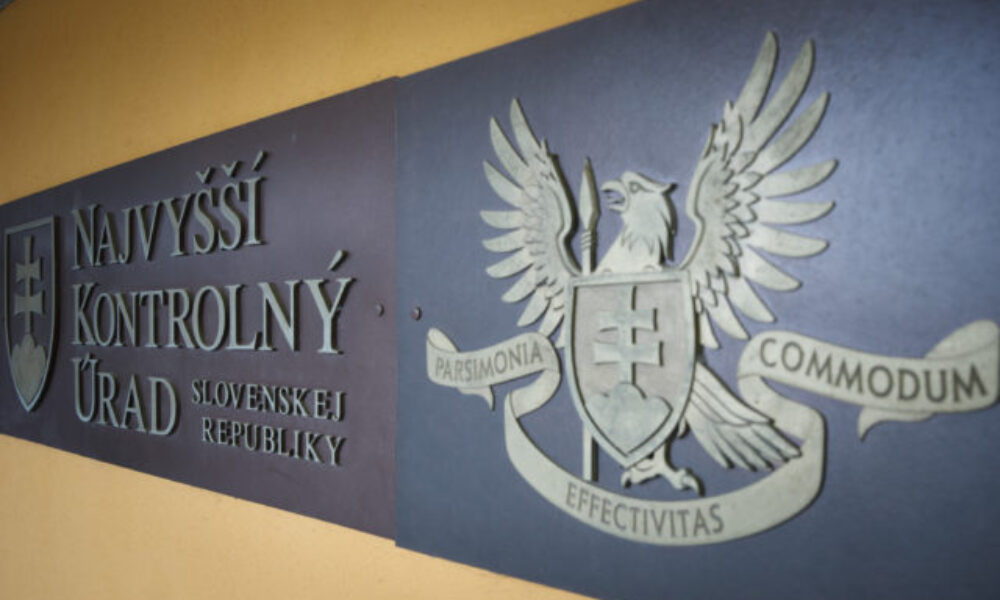
Sarah McLachlan has been a force in the music world for over 30 years. She’s sold over 40 million albums worldwide, won three Grammys, and founded the groundbreaking all-women music festival Lilith Fair in the 1990s. She’s also prioritized philanthropy, providing free music instruction for at-risk youth at the Sarah McLachlan School of Music at three Canadian locations as well as partnering with the ASPCA in 2006 for an iconic—and downright haunting—two-minute fundraising commercial featuring shelter animals. The ad, which features McLachlan’s 1997 song “Angel,” continues to air today (it’s also launched its fair share of memes). Although her past work may seem omnipresent, it’s actually been 11 years since the Canadian artist, 57, released new music. That’s about to change with the release of her tenth studio album, Better Broken, on September 19.
Featuring her signature raw and moving lyrics, the record is a poignant reflection on today’s global landscape, as well as her own private world. “Every album is a bit of a postcard as to where I’m at, emotionally,” McLachlan tells L’OFFICIEL. “I think this one just represents me being 57 and having lived through a certain amount of lumps and found a way through. There’s stuff about parenthood—my daughters are both pretty much grown up now, at 18 and 23—and about relationships. There are themes of reclamation: coming out of hard things, figuring out how to move forward, and rebuilding. I was also looking at the state of the world right now, where we’re at as humans, and how we’re evolving—or devolving, depending on how you look at it—and songwriting has always been so cathartic for me and a way to process what I’m feeling and seeing.”
With an emphasis on social themes like women’s rights, the album marks a major turning point for McLachlan, who expanded her creative circle to work with two new producers, Tony Berg and Will Maclellan, this time around. “I think the arts are a really important touchstone for what is happening in the world,” she says. “Being a voice for that is new to me, because I’ve always kind of shied away from anything political. I don’t think this record is political, necessarily; although I guess everything is political, at this point.” Ultimately, her goal is one of unity. “I hope people can draw something from this album that gives them comfort and makes them feel less alone,” she says. “We are all in this together, whether we like it or not, and we have to find a way through and forward. We have to keep listening and keep lines of communication open, and try to be empathetic and understanding. Even in disagreement, we don’t have to hate each other; we can disagree and still find common ground.”
Ahead, McLachlan opens up about the hopefulness of her new music, the staying power of her “painfully earnest” ASPCA commercial, and the legacy of Lilith Fair, which is being honored with a new documentary featuring Olivia Rodrigo, Jewel, Erykah Badu, and more.
L’OFFICIEL: What called you to get back into the studio to record new music after 11 years?
SARAH MCLACHLAN: It was just a timing thing. I’ve been talking about doing a new record for a bunch of years, and I was slowly amassing enough material. Then, two years ago, I met a new producer, Tony Berg, and we hit it off. We decided to try recording a song to see how it went—because it’s a bit like dating; you either connect or you don’t. We had such an amazing time doing that one song that we decided to keep going. I think I had forgotten how much fun it is to be in the studio and to explore, try different musical things, and watch the song develop and come into itself.
L’O: Has your approach to songwriting changed over time?
SM: I don’t know if it’s changed as much as it’s evolved. I think my MO has always been to come from an emotional place—trying to look at the world and look at myself. Where’s my place in it? How do I fit in? How do I try to understand something and move through it? It’s a process of discovery, and I use songwriting as a way to figure stuff out. I don’t think that’s changed, but I’ve evolved in the sense that I am continually in pursuit of not editing myself too much. I’m trying to allow whatever comes out to come out, and then to explore what that is. I know it sounds very woo woo and wishy-washy, but there isn’t really a mathematical equation to it. It’s all about how something feels, which is pretty much how I do everything.
L’O: It’s interesting that you mention self-editing, because it’s not easy to find the right balance between saying too much and too little. But it’s an important tool.
SM: In our everyday lives, yeah. Part of living in a civilized society is keeping our animal nature in check a little bit and recognizing that everything we do has an equal and opposite reaction, and that could be positive or negative, depending on what we do. I obviously write a lot about relationships, because that’s how we are in this world—we’re pack animals, and we have to exist together. But whether it’s [related to] romantic love or friendship or politics, we have to figure out a way to do this together. That’s certainly a big part of the exploration.
L’O: At any point did you think you might not release new music or consider that chapter behind you?
SM: It definitely crossed my mind. There’s a certain amount of trepidation when it comes to putting out a new record, because it also means promoting it and leaving for extended periods of time. One of the things that COVID really taught me—and it’s ridiculous that I didn’t understand this about myself before—is that I’m a real introvert. I enjoy my solitude and being home. So the idea of leaving for great periods of time is not very appealing anymore, and that slowed down the process. But I always thought, I’m gonna put out at least one more record. I also went through a hideous breakup years ago, and I wrote a lot of songs about that. As I moved on, I thought, I’m not really interested in putting out this body of work because I’m over it, and I don’t want to give it any more energy or attention. So I had to go back to the board and start writing again—but things came quite quickly when I started working with Tony and Will, because they’re so creative and that energy begets more creativity.
L’O: There’s a lot of emotion in these songs. Who are you speaking to with the lyrics?
SM: I’m speaking to everybody who has a heart and soul. For me, music is medicine—it’s like a salve for the soul. I think the scarier the times, the more unrest and uncertainty there is. Art holds a really important place in people’s lives because it gives them comfort and respite for a moment. When someone articulates something that you’re feeling but don’t know how to articulate, you’re kind of transported.
L’O: What song on the album is most personal for you?
SM: “Gravity” is one of the most important songs, because it’s about the fraught and challenged relationship that I had for many years with my firstborn daughter. We’re both very stubborn, and she—unbeknownst to both of us—grew up with a ton of anxiety. My generation didn’t really have anxiety; we had shit that was hard, and we just pushed through it. So there were a lot of things we didn’t understand about how it can show up in ways that might look like laziness, or impertinence, or just general fuck you-ness. But the most important relationships in my life are with my children, and not being able to get through to my daughter was incredibly heartbreaking. We went to family counseling and we recognized that what I thought I was communicating clearly, she was not hearing in the same way. It gave me way more empathy and, after working through all the shit and the old patterns, we’ve started to rebuild and form this incredible new relationship. But that song is about the sticky, yucky, middle time when I was just trying to do anything to reach her and show her that she’s loved. As a parent, it was a pretty lonely, scary time.
L’O: The song “Reminds Me” features a duet with MUNA’s Katie Gavin. What was it like to record together?
SM: She’s just delightful and an amazing human being with a beautiful voice. “Reminds Me” is such a sweet, simple love song. We thought it would be a great duet, and we were mulling over who should be on it. I’m hetero, so the obvious choice would be a guy. But love is love, and it shows up in all different kinds of ways—and we should celebrate that, especially in these challenged times. So I wanted to choose a less obvious choice, and to celebrate the different faces of love. When Katie came in and sang, it was just like, Oh my god, this is perfect.
L’O: There’s also something to be said for platforming a young female musician, which has been a big focus of your career. Speaking of, the documentary Lilith Fair: Building a Mystery – The Untold Story premieres on Hulu on September 21.
SM: Yeah, I’ve seen it and it’s freaking amazing. I didn’t even think about that with Katie; it was just about elevating the song. But I love every opportunity to bring other women alongside, because this is a lonely industry and we, as women, have to support each other and lift each other up. Any opportunity for that, I’m all over. The documentary is certainly what [Lilith Fair] was all about: strength in numbers. Women together get shit done.
L’O: In your opinion, what is the legacy of Lilith Fair?
SM: I think there are a few legacies. When I look out and see Taylor Swift having all these women artists open up for her—Katie Gavin included—and Brandi Carlisle constantly championing women, I think that’s a beautiful legacy. I’ve had women come up to me saying, I went to Lilith in the ’90s and you showed me that I could be anything I wanted to be; I’m now running a corporation, huge thanks to you. So there’s quite a legacy with stuff like that. One of the most powerful legacies, for me, are my schools of music. I took the money I made from Lilith, put it into a foundation, and started free music schools. The first one was in Vancouver, and we now have schools in New Westminster and Edmonton, too. We serve almost 1200 kids a year and it’s completely free. It’s all about community music making and it’s a safe space to be exactly who you are and to be seen, heard, and valued as you show up. It’s also a cocreation model, where the kids have agency and have a say in what they learn and how they learn.
L’O: When it comes to your own legacy, what song do fans mention to you most?
SM: That would be “Angel.” [laughs]
L’O: Did you ever imagine the staying power that the song would have, or that the ASPCA commercial would air for so long?
SM: No, no idea. Classically, by the time I’ve finished a record, I’m so sick of all the songs that I don’t ever want to listen to them again. When that record was coming out in 1997, I distinctly remember telling a friend—who reminds me of this—I think the rest of the record’s shit, but “Angel” is pretty good. [laughs] Clearly, I don’t still think that, but I didn’t have a lot of perspective back then.
L’O: How do you feel when the commercial comes on TV today?
SM: Well, I don’t watch TV, so I don’t see it. But people tell me they still do, and it has legs in a lot of different ways. It’s wound its way into a bunch of memes, and I like the opportunity to kind of take the piss out of the seriousness of it, just because the ASPCA ad was just so painfully earnest. And it worked like a hot damn. But I sort of cringe a little bit when I see it. There was so much emoting that I had to do—the director was like, Just a little more. I was like, Oh my God, this is embarrassing. But I love animals, and it really worked and saved a lot of animals‘ lives, which is great. But more importantly, I think that song has gone on to help a lot of people, too. I’ve met so many people over the years who have said, My mother was dying, and that song played at her funeral. Again, something that provides comfort. The idea that I got to be part of people’s really deep, sad moments, and that maybe something I created helped them a little bit in that moment? That’s pretty sweet validation for a people pleaser like myself.
L’O: When you think back to when you were first starting out, is there anything you wish you had known?
SM: I mean, I was pretty young and green. If I could say anything to my younger self, I’d be like, You’ve got this. Trust in yourself. I kind of did, but I also was brought up with so much shame and self-loathing—and I’m still working on that stuff. So just to be kinder to myself. But I also look at that as being what propelled me forward. Hearing, You’re never gonna amount to anything and you will fail just pushed me harder to succeed.
L’O: What are you ambitious for now?
SM: I’m ambitious to raise $30 million for my music schools so they can create an endowment. That’s been a big focus of mine. Just raising the general operation costs every year has been a big part of my life for the last 20 years, but raising an endowment is going to be a big thing. I’m actually really excited to tour this record and to leave, because I love it so much. I’m super excited for the Lilith doc coming out. I have this general state of hopefulness that I’m really trying to hold on to. Music really helps me, and when this record comes out, I’m hoping that it can be a bit of medicine for other people. Beyond that, my baby is going off to university, so I’m going to be an empty nester. It’s a good time to stay busy and throw myself into work so that I don’t lose my shit completely. [laughs]












